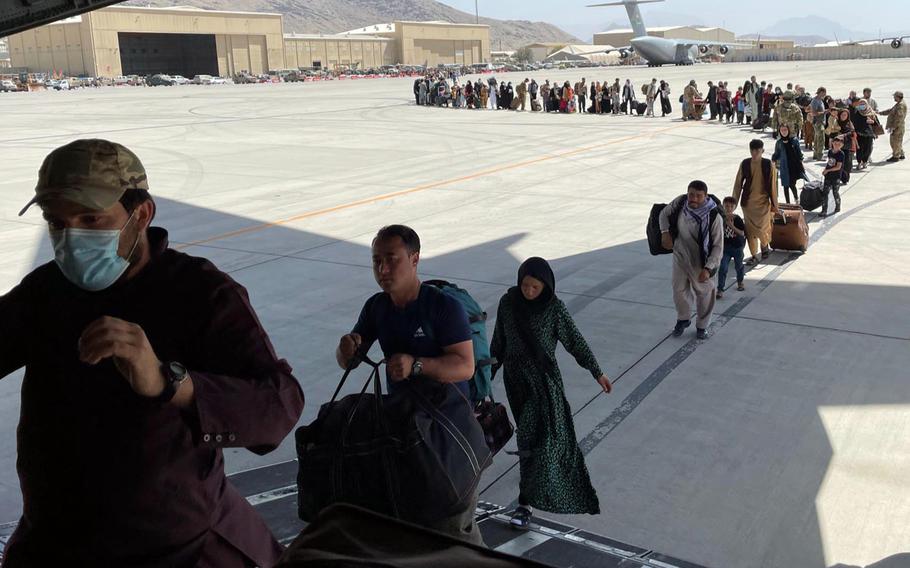
Afghan and American evacuees board an Air National Guard C-17 Globemaster III at the Kabul International Airport in August 2021. While many Afghans affiliated with the U.S. were evacuated to safety, thousands who worked with U.S. forces are still attempting to leave Afghanistan. (New York Air National Guard)
Veterans groups are urging President Donald Trump to make exceptions for Afghan allies who are now barred from entering the United States under executive orders, including the families of active-duty service members left behind following the 2021 withdrawal from Afghanistan.
At least 200 service members’ families are among thousands more in limbo following the suspension of the U.S. Refugee Admissions Program, according to #AfghanEvac, a nonprofit, veteran-led coalition that has worked to evacuate Afghans who assisted U.S. forces during the 20-year war.
Another executive order barring the distribution of foreign aid has halted services for Afghans seeking special immigrant visas, which provide a path for legal entry.
One paratrooper in the 82nd Airborne Division told Stars and Stripes that he has been struggling to find a solution for his sister, who has spent more than three years trying to escape Afghanistan as a refugee.
The paratrooper, who was granted anonymity for fear of his family’s safety, worked as an interpreter with the U.S. military in Afghanistan for three years — often accompanying Army Special Forces on counterterrorism operations, including night raids, he said.
When the Taliban seized control in August 2021, he was able to evacuate along with several of his family members. His sister, lacking the necessary paperwork and being too far from the Kabul airport, had to stay behind.
Over the past three years, while serving in the Army, he has helped move her refugee case forward.
“She was almost done,” he said. “If this wouldn’t have happened, she would be out of the country within a month or two.”
“I think serving this country is one of the best things that happened in my life and I will continue to serve,” he added. “But this decision to leave U.S. service members’ families behind is totally unfair.”
The Defense Department did not respond to questions about whether it is seeking to create exceptions for service members’ Afghan families or provide resources for those who have been impacted.
The paratrooper said that he has been reaching out to lawmakers and federal officials in the Pentagon in the hope of being reunited with his sister. But he worries that little will be done without presidential action.
“He is my commander,” the service member said of Trump. “Who is now going to help if he’s not?”
Retired Gen. Frank McKenzie, the former head of U.S. Central Command who oversaw the withdrawal from Afghanistan, said that the United States owes a debt to those Afghans who were loyal to America, and that he remains optimistic the White House will resume the evacuations.
“I would let this administration go through its decision-making process,” he said. “They’re just starting, and positions can be modified.”
Shawn VanDiver, veteran and president of the coalition #AfghanEvac, said he believes this is an unintended consequence and expects the administration will take steps to amend the order.
VanDiver said lawmakers on both sides of the aisle have been supportive and that the message has made its way to top leadership in Washington.
“We’re not laying any blame at anyone’s feet,” he said. “We know that in the early days of an administration it can be chaotic – growing pains. But we want to influence their decision-making process by making sure they know the impact.”
More than 124,000 Afghans were airlifted out of Afghanistan during the withdrawal of U.S. forces in 2021, according to the State Department. In the years since, the U.S. has continued to evacuate citizens who, because of their work with Americans, face an increased threat of retaliation from the Taliban.
Prior to Trump’s inauguration, advocacy groups had spent weeks urging the incoming administration to leave Afghan allies out of policies to curb immigration.
At least 40,000 Afghans have been impacted by the suspension of the refugee program, according to #AfghanEvac. Thousands more were stranded by the halting of foreign aid, which resulted in canceled flights and the suspension of resettlement services.